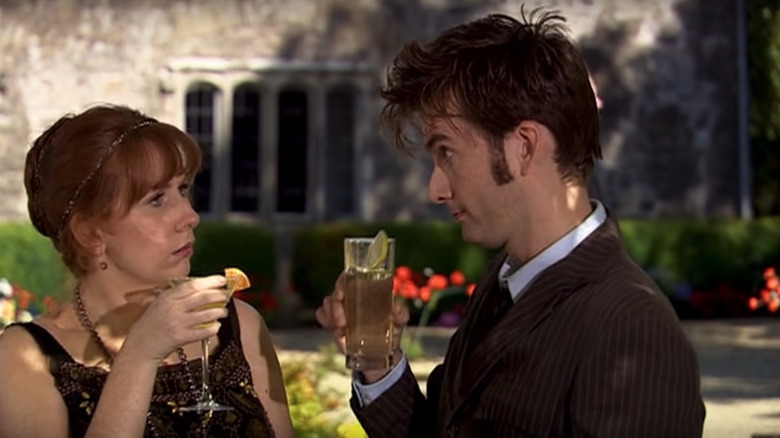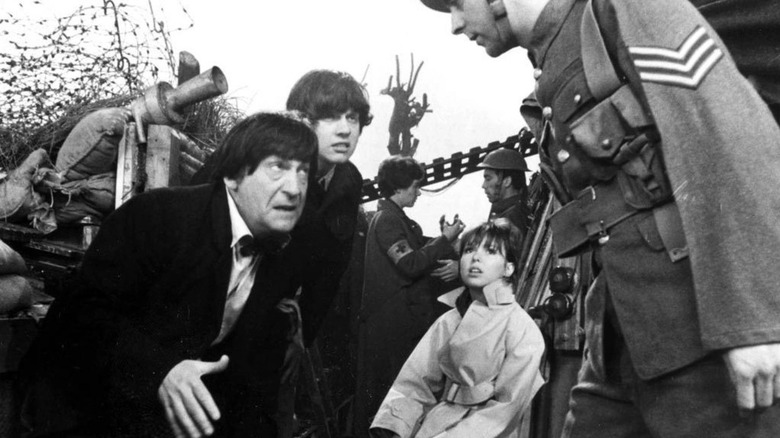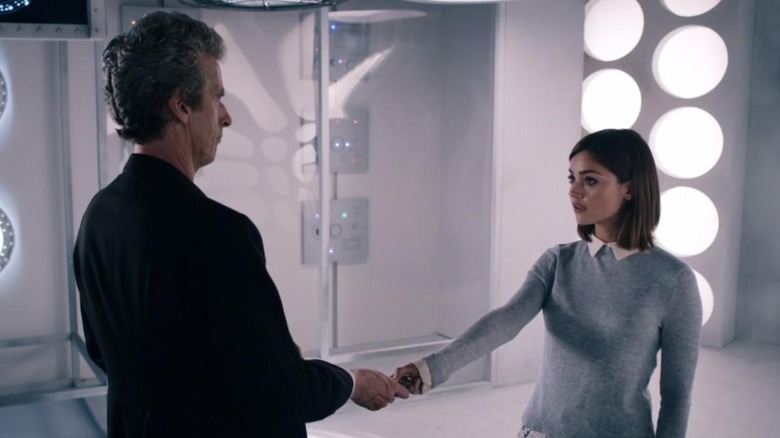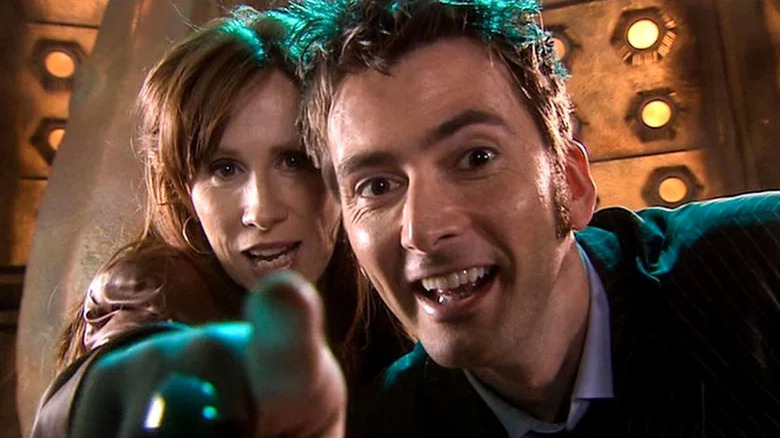How Catherine Tate's Doctor Who Contract Determined Donna's Fate
Of all the Doctor/companion dynamics of showrunner Russell T Davies' tenure on "Doctor Who," season 4 had the most interesting. After two companions in a row where the show flirted around with the idea of Ten (David Tennant) falling in love with his companion, they finally gave him Donna (Catherine Tate), a woman whose relationship with him was purely platonic the entire time. At no point did the show even consider the possibility of giving the two a melodramatic love story; they were simply good chums from start to finish.
This is part of why season 4 is often considered the strongest of the revival, with "Turn Left," "Silence in the Library/Forest of the Dead," and "Midnight" being some of the most widely acclaimed episodes of the whole show. The two simply bounce off each other well, and it was fun watching Donna evolve so far past the cranky, incurious person she was in her initial appearance in "The Runaway Bride."
Unfortunately for fans of Donna, Catherine Tate only had a one-season contract with the show. And with the end of both Tennant's and Davies' tenures on the horizon, it was around time for the character to stop traveling with the Doctor, as companions always do. But Donna was not like the last companion, Martha (Freema Agyeman), who made the active choice to leave the Doctor. Donna loved her time with Ten and would never willingly give up the chance to keep going on adventures across time and space. As a result, Davies gave her an exit that was arguably just as bad as killing her off entirely: He erased her memory.
Not the first time someone lost their memory
In an interview between showrunners Steven Moffat and Russell T Davies, Moffat pointed out another time in "Doctor Who" where a companion had their memory wiped: the 1969 story "The War Games," centering around the second Doctor, Patrick Troughton. Moffat read about the famous episode as a kid before he got to see it and remarked to Davies in the June 2020 issue of Doctor Who magazine about how different the episode was from his expectations:
"When I read that Jamie and Zoe had their memories wiped, I was appalled. I was moved, and haunted. I couldn't imagine what that scene must have been like. The crying, the pleading, the tragedy, the loss ... and then, many years later, I saw the episode on VHS and it was nothing at all. They just strolled past it."
For as great as the classic show was, it wasn't a show that tended to dwell on emotions in the same way modern "Doctor Who" does. When Donna gets her memories wiped in the season 4 finale, it's not something the show strolls past. It's something the show suitably treats as a tragedy. Erasing Donna's memory isn't a convenient plot device; the Doctor is essentially killing a major part of her when he does it. Not only that, but he does it against Donna's will. "Don't let me go back," she says. It's a line revealing that she knows how unsatisfying her life was before she met the Doctor, and how she doesn't want to return to who she was then. But the Doctor makes her go back anyway, and it's super depressing. All her wonderful character development over the past 13 episodes have been erased, and she's the only one who doesn't know it.
Not the last time, either
In the interview, Steven Moffat seemed interested in the idea of redoing past story beats correctly. Regarding Donna's fate and the companions' fates in "War Games," he asked Russell T Davies, "Did you have the same thought, and did that seal Donna's fate? I mean, getting that story beat right? Were you taking that idea and putting the emotion in?"
Davies said it wasn't a conscious factor in his decision: "I thought of it purely because we had Catherine Tate for one year only. Turns out she loved it so much, she'd have stayed forever. But when I was planning it, it was a one-year contract. So if you give a companion the time of their life ... how else do you get them out? It was the only possible exit."
But one wonders if Moffat's future resolution to Clara's (Jenna Coleman) storyline was a response to the classic story. In the season 9 finale, "Hell Bent," Twelve (Peter Capaldi) tries to wipe Clara's memory, but she refuses. "These have been the best years of my life, and they are mine," she says. "Tomorrow is promised to no one, Doctor, but I insist upon my past. I am entitled to that." Unlike with Donna five seasons before, this time the Doctor listens. The finale ends with the Doctor losing his memories of Clara, not the other way around. But unlike Clara or Donna, the Doctor has lived long enough that losing his memory of a companion won't fundamentally change who he is as a person.
Hope for Donna's memories
The season 9 finale understands on a core level that the Doctor is far more important to each of his companions than his companions will ever be to him, purely due to the fact that he's lived for so much longer. Taking Clara's memories of the Doctor would be to kill off a major part of her; taking the Doctor's memories of Clara is a much smaller comparative sacrifice. Clara's got one of the more interesting departures of all the modern companions, one that feels like a direct response to both Donna, Jamie, and Zoe's fates. It almost feels like a critique of the way Donna's storyline went down, as if Moffat's subtly trying to make the case that the Doctor was wrong to do what he did to her.
Donna's fate still stings over a decade later, which is why fans of the character should be happy to hear Donna and Ten will be returning for the show's 60th anniversary special, airing next year. Not only that, but Russell T. Davies is returning as showrunner as well. We have no idea what this means for Donna's fate, exactly; unfortunately, the most likely explanation is the special will take place for Donna sometime before her memories were removed. But hey, nothing's certain. If the last anniversary special could retcon the whole time war, maybe this one will give Donna the opportunity to regain her memory. We can only hope.



